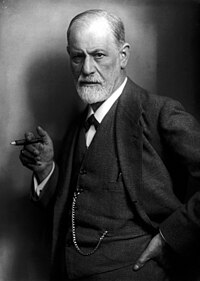In Anthony Kenny's book "Philosophy In The Modern World" Sigmund Freud is described as the continental thinker who had the greatest influence on Anglo-American philosophical thought throughout the twentieth century. Surprisingly, he is not a philosopher at all, Freud regarded himself as a scientest and an inventor of a new science.
Freud was born in Moravia in 1856. Fread is best known for his theories of the unconscious mind and the mechanism of repression. In 1860 his family moved to Vienna, where Freud trained as a doctor and joined the staff of the General hospital in 1882 where he specialised in brain anatomy. Freud also collaborated with neurologist, Joseph Breuer, treating hysterical patients under hypnosis.
In 1895, in conjunction with Breuer, Freud published work on hysteria which presented an original analysis of mental illness. Freud gradually started to stop using hpnosis as a method of treatment and he began to replace it with a method he called psychoanalysis. He described this form of treatment as nothing more than an exchange of words between patient and doctor.
Freud believed that the reasons for hysterical symptoms was because the patient had repressed memories of a pychological trauma. He found that having the patient lying down on a couch and talk about whatever came to mind would help the patient recover through a process of free association. Freud was investigating the mind and treating psychopathology through dialogue between a patient and psychoanalyst.
In 1900, Freud published the most important of his works, "The Interpretation of Dreams". Freud argued that our dreams are coded so we are unable to interpret them and all codes are repressed sexual desires.
In Freud's view, dreams were all froms of wish fulfillment which meant these were attempts by the unconscious t resolve a conflict of some sort. whether iwas somehting recent or something from the past. However, because the information in the unconscious is often disturbing, the preconscious will not allow it to pass unaltered into the conscious. The exercise of free association, reveals thge underlying pattern of the unconscious mind.
In 1923, Frud published "The Ego and the Id". In this, Freud describes our Id as the dominant part of our personalities. He descirbed the Id as our basic desires and instincts which we develop from birth but it should be repressed. The ego is the most superficial portion of the id and one which has been modified by the influjence of the external world. The superego dominates this ego and represents inhibitions of instincts that are characteristics of man.

No comments:
Post a Comment